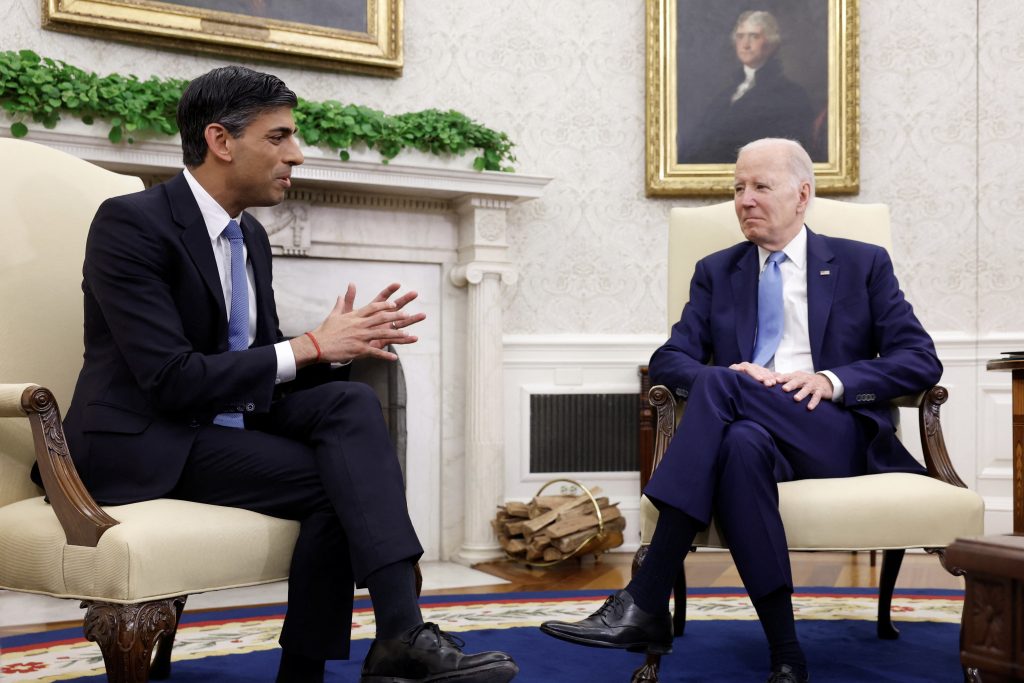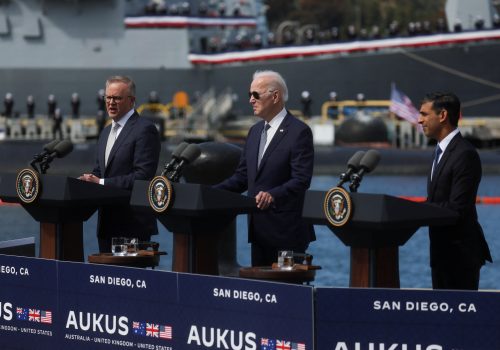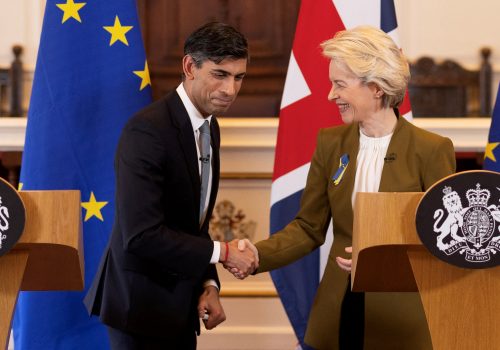UK Prime Minister Rishi Sunak arrived in Washington Tuesday night for talks with US President Joe Biden. According to the White House, discussions will focus on shared economic and security challenges including energy security, the climate crisis, and Ukraine. Both leaders are fresh off the Group of Seven (G7) Summit in Japan where these issues got a thorough airing, and these talks should be an opportunity to go deeper into the details on a bilateral basis. While Ukraine will likely grab the headlines from a national security perspective, another important, albeit under-the-radar issue should also be on the agenda: export controls reform.
Export controls are often thought of for their role in preventing the transfer of arms and other sensitive technologies to malign actors, or as a foreign policy tool used alongside economic sanctions to punish illegal activity. This was the angle taken at the G7 with specific reference to Russia and China, but that viewpoint obscures a different problem. The United States’ closest allies have been quietly frustrated for decades that the indiscriminate and extraterritorial application of these same export controls, in particular the International Traffic in Arms Regulations (ITAR), seriously hinders efforts to share technologies and collaborate with allies on capability development projects. This is due to the costly and time-consuming processes associated with ITAR compliance. But this isn’t just a time-versus-cost-versus-quality issue for program managers to deal with. It’s much bigger than that. As William Greenwalt, a nonresident senior fellow at the American Enterprise Institute, has said, “US government security policies related to export controls no longer support long-term national security interests and if not modified will likely result in the US military falling further behind in the competition with China.” ITAR was enacted during the Cold War, at a time when the United States enjoyed such technological and industrial dominance over its potential adversaries that it could afford to go it alone, write off allied contributions to military capability development, and absorb the consequences in time and cost when they did choose to partner up. None of those things are true anymore.
The Department of Defense has long recognized that it no longer holds complete technological advantage and recent administrations of both parties have promoted the critical role of allies and partners in their national security strategies. Yet ITAR directly prevents the United States from accessing some of the best allied technology and indirectly reduces the military capabilities of its allies. For example, the UK government estimated in 2017 that it costs UK companies almost half a billion dollars a year to comply with ITAR. That’s effectively a 0.7 percent tax levied by the United States on the national defense budget of a close ally, and money which could be far better spent on increased readiness or on more advanced capabilities that would benefit the United States. After all, depending on exchange rate fluctuations and production lot, half a billion dollars equates to four or five F-35B fighter jets. Even worse, that figure only covers those companies that have the resources and risk appetite to work with the United States in the first place. So-called “ITAR taint,” the risk that any technical cooperation with US entities will lead to the loss of control over their technology, prevents some non-US companies from engaging at all. Data is anecdotal as it mainly comes down to internal bidding decisions by individual companies, but it seems that small and medium size enterprises are especially affected. These are exactly the sort of cutting-edge companies that the United States needs in its corner on everything from quantum computing to materials science.
A focus for discussions at the White House
You would think that with such an obvious downside it would be an easy fix, but no. Unfortunately for the Department of Defense, it doesn’t own ITAR policy or its implementation. The State Department does, and it does not feel the pain of delayed programs and degraded technological advantage. Despite the efforts of many talented and hardworking officials who have dedicated their careers to keeping the United States’ most critical technological advancements out of enemy hands, the organizational incentives are not structured to support the pace or flexibility that modern technology and the current geostrategic and security situation demand. The outdated systems State Department officials are working within have become a mechanism of national self-harm and, at the end of the day, it is the warfighter that loses out.
The good news is that the right people in the legislative and executive branches of the US government are starting to take notice of the problem, particularly in the context of the nuclear submarine deal involving Australia, the United Kingdom, and the United States, known as AUKUS. To date, much of the press about AUKUS has been on the trilateral effort to support Australia in acquiring conventionally armed, nuclear-powered submarines under Pillar One of the agreement. Arguably though, it is the wider cooperation in critical technologies such as artificial intelligence, autonomy, cyber, and electronic warfare envisaged under Pillar Two that represents the real generational opportunity. Behind the scenes, officials and politicians in all three nations are realizing that Pillar Two just won’t stand with ITAR as it’s currently enforced. This is driving unprecedented interest on Capitol Hill, where congressional Republicans in the House and Senate are leading efforts to force the State Department to address the problem. They are advancing the fantastically named Truncating Onerous Regulations for Partners and Enhancing Deterrence Operations (TORPEDO) Act. To quote Senator Jim Risch (R-Idaho), the ranking member of the US Senate Foreign Relations Committee, this legislation “aims to speed up the implementation process by reforming the US regulatory system so we can cooperate in a timely and efficient manner on the capabilities we and our partners need.” This is extremely welcome, but in the complicated world of export controls reform the story begins with legislation but it doesn’t end there. Previous attempts at reform, such as the 2016 legal expansion of the National Technology Industrial Base and the 2022 Open General License pilot program, have stumbled on implementation issues which can only be fixed from within the State Department and will require coordinated action between the executive and legislative branches.
This is where Sunak and Biden should focus their discussions. With his reputation for pragmatism, Sunak should easily avoid the temptation to request a blanket ITAR exemption for the United Kingdom as this would be politically unpalatable and counterproductive. Biden, with his flagship foreign policy initiative in the balance, should commit to work with Congress on a bounded and enforceable exemption under the Arms Export Controls Act for AUKUS nations, and then incentivize the State Department to make it work in practice. Collaboration with longstanding allies and partners is critical to the United States’ success in combating the increasingly dynamic threat posed by its adversaries. To let that flounder on account of an out-of-date and inappropriately enforced export control regime should be an unacceptable outcome for all involved.
Deborah Cheverton is a visiting senior fellow in the Atlantic Council’s Forward Defense program within the Scowcroft Center for Strategy and Security. Cheverton is a career civil servant from the United Kingdom’s Ministry of Defence (MOD), where she has spent almost fifteen years working across a range of policy and delivery areas with a particular focus on science and technology policy, industrial strategy, capability development, and international collaboration. She writes here in her personal capacity as an Atlantic Council fellow, not in an official government capacity. Her views are her own.
Further reading
Tue, Mar 14, 2023
What’s next for the US-UK-Australia submarine partnership?
New Atlanticist By
Dive into the details of the AUKUS submarine partnership just announced in San Diego by US President Joe Biden, UK Prime Minister Rishi Sunak, and Australian Prime Minister Anthony Albanese.
Wed, May 10, 2023
Ukraine’s friends must show ‘we’ve got the grit’ in supporting its fight, says UK foreign secretary
New Atlanticist By Katherine Golden
James Cleverly argued at an Atlantic Council Front Page event that if the West is saving its stockpiles in its "military cupboard" for a rainy day, "this is the rainy day."
Fri, Apr 28, 2023
How the EU and UK can start to collaborate in a post-Brexit world
New Atlanticist By Jörn Fleck, Ben Judah
As EU ambassadors to London gather to discuss the future of the relationship, here are six ambitious but realistic ideas for cooperation.
Image: US President Joe Biden meets with Britain's Prime Minister Rishi Sunak in the Oval Office at the White House in Washington, U.S., June 8, 2023.



